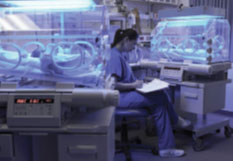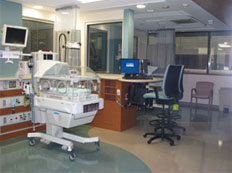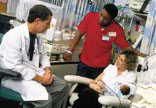The NICU
Your baby is a patient in the Neonatal Intensive Care Unit (NICU). For many parents, this is a time of worry, stress and questions. Getting answers to your questions can help ease some of this stress. The following information answers basic questions you may have about the NICU. Because NICUs are different at each hospital, please talk to the health care staff in your unit if you have questions that are not answered in this website.
What is the NICU?
 The NICU is a unit in the hospital where babies born early (premature) and/or need special care are treated. What does NICU stand for?
The NICU is a unit in the hospital where babies born early (premature) and/or need special care are treated. What does NICU stand for?
N = neonatal (“neo” means new and “natal” means birth) = new birth
ICU = intensive care unit – a special section of the hospital where high-risk infants will receive medical care that is focused on his or her unique needs.
Each NICU is set up to provide a certain level of care. In some cases, a baby may need to be moved to a unit that provides a higher level of care. As your baby’s health is improving, they may no longer need higher level of care. At this stage they might be moved back to the birth hospital to be closer to home and family. This transfer allows the availability of higher acuity services for subsequent infants that may need it.
The goal of every NICU is to help a baby’s body functions to become stable so that they can grow and thrive on their own.
What does the NICU look like?
 The NICU has many small beds, some of which are open and some that look like glass boxes. The open beds are called warmers. The closed beds are called isolettes. These beds keep your baby warm and are designed for his or her own special needs.
The NICU has many small beds, some of which are open and some that look like glass boxes. The open beds are called warmers. The closed beds are called isolettes. These beds keep your baby warm and are designed for his or her own special needs.
Light and sounds are kept as low as possible in the NICU to help the babies rest. You will see a variety of equipment in the NICU to help with your baby’s breathing, feeding, medicines, and fluids. There are also monitors that keep track of your baby’s vital signs, such as heart rate, breathing and blood pressure. You may hear many alarms come from these monitors. Be assured the nurses and doctors are trained to know when and how quickly to respond to each alarm. Even small changes, such as your baby’s movement, can make the alarms sound.
You are a vital part of your baby’s care. The doctors and nurses will work with you to give your baby the best care possible. For instance, they will talk with you about your baby’s treatment plan. NICUs have features to help you be a partner in your baby’s care. These might include: a chair for you to sit near your baby; rooms near the NICU; a family designated area; private spaces for talking with the doctor or other staff; and/or a private place for pumping breast milk. As your baby becomes stronger, nurses can help you to support your baby’s care in the NICU.
Can I stay in the NICU with my baby?
This differs with every unit and every baby. It can be very hard for parents to leave the NICU while their baby is there and you may want to stay near your baby as much as you can. Some babies may stay a few days in the NICU, while others may stay a few months. During this time, you will have to balance your baby’s need for rest with your own need for rest. Some options open to parents include rooms that can be rented from the hospital referred to as ‘hotel rooms’. The Ronald McDonald house is close by and can provide rooms as well as daily services. The social worker can help you determine how to access these services.
We realize that you can not be at bedside all the time so many NICU beds have cameras called NICVIEW. These secure cameras are designed to help parents, siblings and relatives get to know their newborn by watching daily progress.
Can I touch or hold my baby?
 This depends on your baby’s unique needs. Most babies benefit from being held and from their parents’ touch. At first, though, some babies may not be able to handle too much movement because their bodies are very fragile. In addition, too much light, sound or touch can cause sensory overload for some babies. As soon as your baby is ready, the health care staff will show you helpful ways to touch and hold your baby as well as show you how to know when your baby is distressed or at ease.
This depends on your baby’s unique needs. Most babies benefit from being held and from their parents’ touch. At first, though, some babies may not be able to handle too much movement because their bodies are very fragile. In addition, too much light, sound or touch can cause sensory overload for some babies. As soon as your baby is ready, the health care staff will show you helpful ways to touch and hold your baby as well as show you how to know when your baby is distressed or at ease.
What can parents do?
 The most important thing you can do is be an active member of your baby’s health care team. The health care team will work with you to do what is best for your baby.
The most important thing you can do is be an active member of your baby’s health care team. The health care team will work with you to do what is best for your baby.
To be an active partner, you can:
1. Ask questions: this can help you keep track of your baby’s care. It can also help you learn more about your baby’s needs and can help the health care staff learn more about you. In an area that is so new to you, it may help to write down your questions. This new world of the NICU is very complex, so don’t be afraid to ask the same questions over and over until you understand.
2. Share information with your family: this will help them know where your baby is, how he or she is being cared for, and how they can help you.
3. Take care of yourself: this is a stressful time for you and your family. Seek help from family and friends, and from hospital staff, such as counselors, social workers or pastors.





